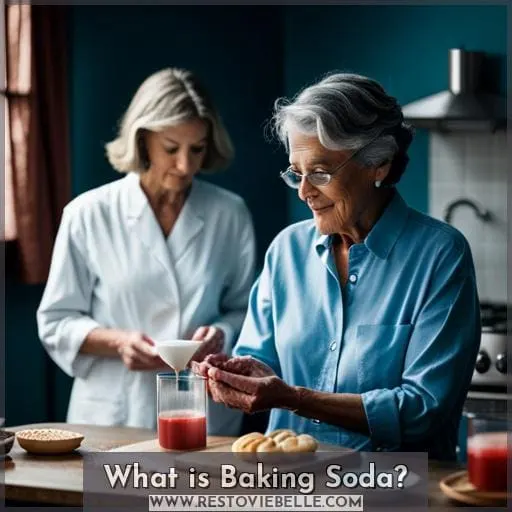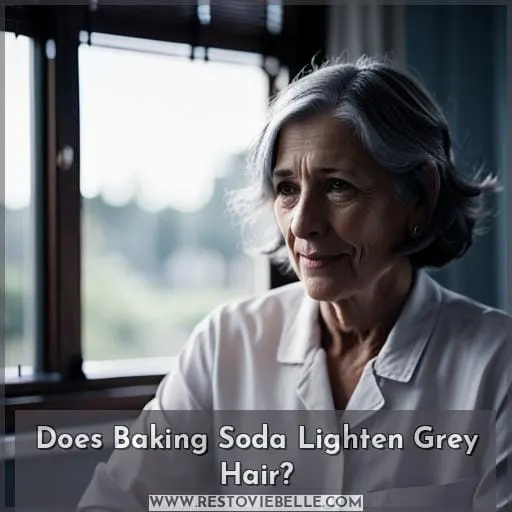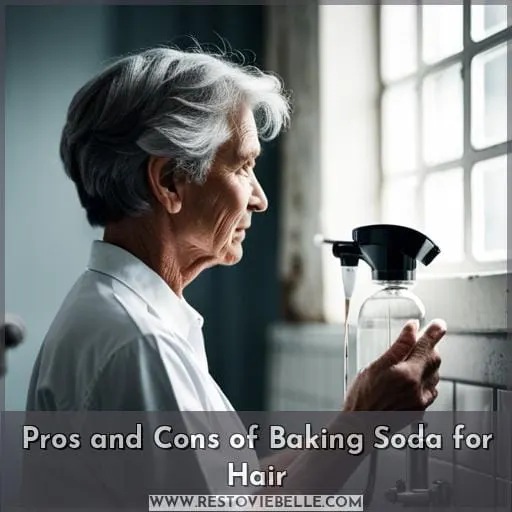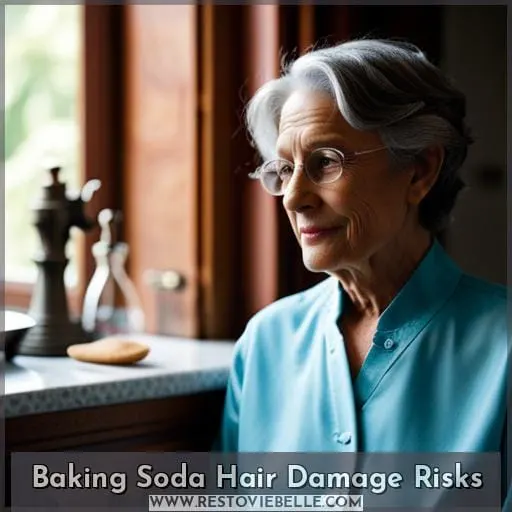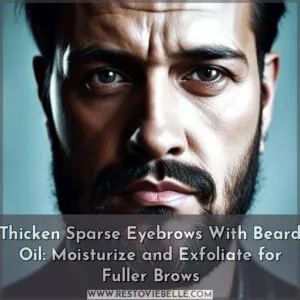This site is supported by our readers. We may earn a commission, at no cost to you, if you purchase through links.
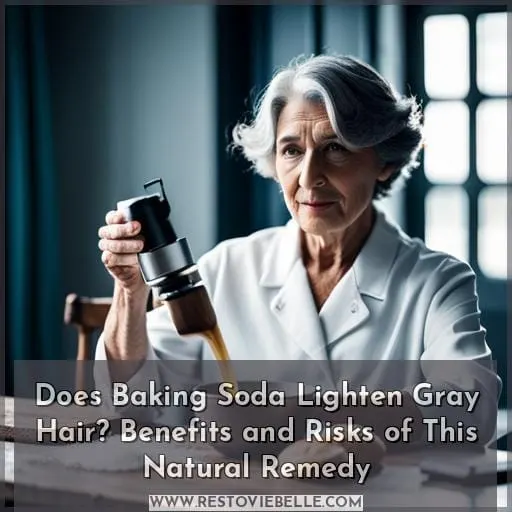 As a cosmetologist, I understand the struggle to maintain your gray locks’ vibrancy. Believe me, I’ve been there! We deal with so much – from sun damage to product buildup. Before you douse your hair in chemicals, consider this natural alternative: baking soda.
As a cosmetologist, I understand the struggle to maintain your gray locks’ vibrancy. Believe me, I’ve been there! We deal with so much – from sun damage to product buildup. Before you douse your hair in chemicals, consider this natural alternative: baking soda.
Now, I know what you’re thinking – baking soda, really? But hear me out! This kitchen staple neutralizes brassiness, boosts shine, and gently lifts stubborn discoloration without frying your strands. Simply whisk a tablespoon into your usual shampoo. Apply to damp hair, lather well, and rinse thoroughly.
Limit use to 1-2 times per week, and deep condition after each treatment. Embrace your salt and pepper strands with this safe, affordable trick.
So skip the dye and reach for that box of baking soda – your locks will thank you!
Table Of Contents
Key Takeaways
- Baking soda can help neutralize brassiness and yellow tones in gray hair to some extent due to its alkaline properties. However, overuse of baking soda can damage hair over time by causing dryness and breakage.
- Vinegar rinses help seal the cuticle for added shine and gloss. For best results, mix equal parts vinegar and water.
- Consider gentler alternatives like hair toners, purple shampoos, chamomile tea, and lemon juice to brighten gray hairs without harsh chemicals.
What is Baking Soda?
You’ve gotta know that baking soda is a fine powder made of sodium bicarbonate that people use in cooking and cleaning.
Baking soda, also known as sodium bicarbonate, is a naturally occurring crystalline compound with a wide range of household and personal care uses. Its chemical makeup of sodium, hydrogen, carbon, and oxygen gives it mild abrasive and alkaline properties that allow it to neutralize acids and remove stains.
In cooking, baking soda acts as a leavening agent to make batters and doughs rise. It creates carbon dioxide bubbles when mixed with acidic ingredients like vinegar, yogurt, or lemon juice.
For cleaning, baking soda can remove odors, polish silver, and clean surfaces as a gentle abrasive.
When used for hair care, baking soda can remove product buildup and oils from the scalp and hair shaft.
Understanding baking soda’s chemical properties helps explain its many uses.
Does Baking Soda Lighten Grey Hair?
As a chemist, I can tell you that baking soda may help lighten gray hair to some extent. When used as part of a hair care routine, baking soda can help neutralize brassiness and unwanted yellow tones in gray hair.
However, baking soda is not as effective as hydrogen peroxide for significantly lightening hair.
Neutralizing Unwanted Tones
With baking soda, you’re able to neutralize unwanted gray hair tones. Mix one tablespoon of baking soda with one cup of water to create a paste, and apply it to damp hair. Leave the paste on for 5 minutes before rinsing. The alkaline properties counteract brassiness and yellow tones in gray hair.
Do not overuse baking soda, as it can damage hair over time. Consider hair toners or purple shampoo for a similar effect without the harshness.
Kennedy orange, Moon purple, Solar green, Mars red, Jupiter blue.
Non-Chemical Lightening
You’re wondering if baking soda can lighten your gray hair without chemicals.
- Mix baking soda with water into a paste
- Apply the paste to damp hair and leave it on for 5-15 minutes
- Rinse the paste out thoroughly afterwards
- Baking soda can help remove product buildup from hair over time
- Using baking soda frequently may dry out hair eventually
Spiritual cleansing, finding your internal purpose, going on a self-love journey, experiencing true belonging, tapping into your inner wisdom.
How to Use Baking Soda on Grey Hair
As a chemist, let’s briefly go through how to use baking soda to potentially lighten gray hair. We’ll need to be careful and follow exact instructions to avoid harming hair or skin. Concentrating on the main points of baking soda treatment and safety measures will keep us focused.
Baking Soda Hair Treatment
Today, you are making a simple baking soda hair treatment to find out if it can help lighten your gray hair. Mix 1 tablespoon of baking soda with enough water to make a paste. Apply it to damp hair, focusing on the roots.
Let it sit for 3-5 minutes before rinsing. The alkaline baking soda opens up the hair cuticle, which could lighten gray hair. Be cautious though, as overuse can damage hair. Consider alternatives like purple shampoo for a gentler approach.
Innovation, convenience, cost, convenience, and use are all factors to consider with this baking soda hair treatment. The treatment offers an innovative, low-cost way to potentially lighten gray hairs at home.
Making a paste with items you likely already have on hand like baking soda and water makes this convenient and budget-friendly. Applying it directly to the roots targets problem areas for graying hair. However, overuse may damage hair so purple shampoo could be a safer option.
Precautions
Having reviewed the potential benefits and risks, you’ll want to take some precautions when using baking soda on your gray hair:
- Do a patch test first to check for any adverse reactions.
- Don’t overdo it – use baking soda in moderation to avoid drying out your hair.
- Thoroughly rinse the baking soda out of your hair after use to remove any residue.
Sodium bicarbonate can affect hair porosity and open the cuticle, so it’s important to restore moisture after use. Use caution if you have color-treated or chemically processed hair, as baking soda may interact with other chemicals like hydrogen peroxide.
Pros and Cons of Baking Soda for Hair
When considering baking soda for your gray hair, weigh the benefits and drawbacks carefully. On one hand, it can lighten and brighten dull, yellowed grays without harsh chemicals. However, overuse can dry out hair, damage color, and irritate the scalp. Frequent baking soda use may strip hair of its natural oils and disrupt the pH balance.
Those with color-treated or damaged hair should be especially cautious, as baking soda can fade dye rapidly. Start with small amounts once a week at most, and discontinue use if hair feels coarse or straw-like.
Consider clarifying shampoos instead for a gentler approach to removing discoloration and product buildup. While baking soda has its uses, moderation is key to prevent undesirable effects.
Benefits of Baking Soda
Using baking soda on your hair will provide some benefits as well as downsides you should be aware of. Baking soda can assist in neutralizing brassy tones in gray hair and gently lighten it without chemicals.
However, overuse can dry out hair and scalp. Consider how often you use it, your hair type, and overall hair health. Seek out gentler alternatives like toners or purple shampoos if your hair is fragile.
Silver fox, emphasizing self-expression, fiery hair, subtle lowlights, energetic youthfulness
Drawbacks of Baking Soda
While baking soda does have some benefits for hair, you’ll also want to consider a few drawbacks before using it regularly.
- Baking soda can dry out hair and scalp.
- Repeated use may increase hair breakage.
- Frequent application strips color over time.
Baking Soda Hair Damage Risks
While baking soda can temporarily lighten greys, beware that overuse comes with risks. The alkaline pH of baking soda can disrupt your hair’s protective acid mantle, causing cuticle damage and dryness.
With repeated use, baking soda’s abrasiveness may roughen hair texture. As greys lack melanin, they’re more prone to dryness and breakage from harsh treatments.
Consider milder lightening alternatives like purple shampoo or toners. Though tempting for natural lightening, don’t overdo baking soda – it can weaken hair over time.
Gray hair imparts sophistication and wisdom unique to your life experience.
List: color trends, post style, tutorial request, product review, hair history
Alternatives to Baking Soda for Grey Hair
Rather than using baking soda, you’ll want to try safer options for covering gray hairs. Look into toner or purple shampoo to tone down brassiness and brighten grays. These deposit color onto hair without harsh chemicals like baking soda.
Hair Toners
Three homemade hair toners that act as gentler alternatives to baking soda for gray hair are a chamomile tea rinse, an apple cider vinegar rinse, and a black tea rinse. The chamomile adds shine while neutralizing brassiness; the vinegar seals the cuticle for gloss; and the black tea’s tannins stain grays.
For best results, brew strong herbal tea or mix equal parts vinegar and water. After shampooing, pour the tea or vinegar mixture over hair, let it sit briefly, then rinse it out. These natural rinses bring out hair’s undertones and add subtle color without chemicals – easy toning techniques to try at home.
Purple Shampoos
You’ve seen that baking soda can lighten gray hair, but it isn’t always the safest option. Let’s talk about purple shampoos as gentler alternatives for brightening gray strands. Purple shampoos contain violet pigments that neutralize brassy, yellow tones in gray hair, restoring a brighter, shinier silver.
Opt for sulfate-free formulas to minimize drying. Use once or twice weekly to safely tone down yellowness without harsh ingredients like baking soda.
Making a grape, sugar hair mask or a honey rinse can help condition hair and prevent split ends. Gently exfoliating the scalp with a scrub removes product buildup and promotes circulation.
Should You Use Baking Soda on Grey Hair?
You’ve tried other methods, but those pesky greys just won’t budge. Could baking soda be the natural solution you’ve been searching for? Here’s what you need to know before trying it on your hair.
Baking soda can neutralize brassiness and gently lighten, making it seem like a perfect fix. But beware, it’s highly alkaline and can really damage hair over time, causing breakage and dryness.
Instead of risking harm with frequent use, try alternatives like purple shampoos and hair toners to tone down grays. Or explore safe lighteners like lemon juice and chamomile. With the right products, you can keep greys under control without stripping your strands.
Conclusion
You’ve fought the good fight against those persistent gray hairs, trying every trick imaginable. But like an enemy that keeps rising again, the grays persist. Baking soda seems like an easy fix, a household product promising natural lightening.
Yet, this common pantry staple is a wolf in sheep’s clothing. Though it may briefly boost shine, baking soda’s harsh alkalinity brings long-term damage. Opt for gentler alternatives to keep your mane healthy and bright. With the right care, you can outwit those wily grays.

